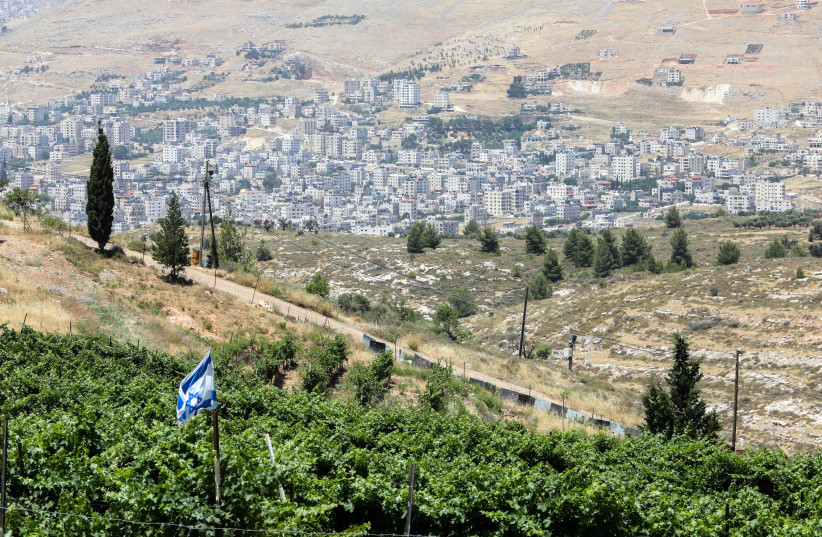T. Belman. International law holds that the lands are ours. To say they are “disputed” doesn’t alter the fact that they are ours. The Arabs have no right to them. In my opinion to say they are disputed in a misnomer.
It is not Palestinian land. It is land that is disputed, and the only way to resolve this is if the two sides can negotiate a settlement of the dispute directly together.
By Jason Greenblatt, JPOST JUNE 14, 2020
Settlement of Elon Moreh, near Nablus, West Bank, June 11, 2020 (photo credit: MARC ISRAEL SELLEM)
On Friday, an opinion piece by Yousef al-Otaiba, United Arab Emirates ambassador to the United States, was published in an Israeli newspaper. I spent three years at the White House working to bring Israel and its Arab neighbors closer, and though the op-ed’s overall message potentially undermines my efforts and those of the Trump administration, I commend Otaiba for writing it. I am glad he spoke directly to an Israeli audience.
Moreover, his piece is well written and devoid of the hysteria and robot-like comments often seen from diplomats and politicians who speak about the Israeli-Palestinian conflict.
I don’t want there to be any misconceptions. To put it bluntly, I strongly disagree with parts of the op-ed. For example, I don’t agree that the extension of Israeli sovereignty to the areas being contemplated would be an illegal seizure of land. The US government also does not believe so, which is why President Donald Trump’s vision for peace provides for this concept.
I personally support the move, but my personal opinion is not relevant. I am not Israeli. It will be the decision of Israel’s democratically elected government whether to move forward with this.
I also strongly disagree with his use of the term “Palestinian land.” It is not Palestinian land. It is land that is disputed, and the only way to resolve this is if the two sides can negotiate a settlement of the dispute directly together. But that has proven to be elusive. This is one of the main reasons we drafted the vision for peace in the manner that we did.
The Palestinian leadership is fractured perhaps beyond repair between the leadership in Ramallah and the bloodthirsty Iran-funded terrorists in Gaza who subjugate approximately two million Palestinians and cause much suffering to Palestinians and Israelis. But the leadership in Ramallah rejected the vision for peace before it was even published. Indeed, they rejected, again and again, plans and ideas put forward by prior US administrations. Our view was that the leadership in Ramallah should no longer have a veto on what happens to this land and to the Israelis living there. But to protect the Palestinians, we gave them a lengthy period – four years – to get their house in order so that they, too, could obtain the many benefits contemplated by the vision for peace.
After spending countless hours throughout the Arab capitals over three years, I came to learn that we agree on far more than we disagree on. I also know that friends and allies can disagree on important things, and the UAE is an important friend and ally of the US. Ultimately, the UAE has the right to do what is best for the UAE and to act according to what it believes in. Just as I respect Israel’s right to make its decisions (including the very decision discussed in the op-ed), I respect the UAE’s right to make its decisions.
As noted in the op-ed, the UAE has made some dramatic changes in the past few years in relation to Israel and to the Jewish community. That is a result of the strong leadership and vision of His Royal Highness Mohammed bin Zayed. He is a pragmatic, open-minded, tolerant leader whose intentions are to unify and bring the region forward in a positive direction.
If Israel chooses to move forward with the application of Israeli law to those areas, I nevertheless hope that there will be continued, significant progress in the relationship between the UAE and Israel. This progress is important for the region for so many reasons, including its security.
Let’s not forget that this past January, Otaiba, together with Omani Ambassador Hunaina al-Mughairy and Bahraini Ambassador Abdullah bin Rashid Al Khalifa, came to the White House to participate in the release of Trump’s vision for peace. I have tremendous respect for that historic move. They applauded at many points and were warmly welcomed and applauded by those in attendance. They should still be warmly welcomed and applauded. They did not agree with all that was in the vision (likely far from it), and yet they came and supported us.
I still look forward to eating kosher food when I travel to the UAE. I hope that the UAE will still proceed to develop the Abrahamic Family House in Abu Dhabi, where a mosque, a church and a synagogue will be colocated in the same complex. I would be excited to pray there with my tefillin, in the same way that I prayed in a synagogue in Bahrain last year.
Despite our deep differences on some of these issues, I will forever be grateful that in some capitals in the region the leadership was always willing to have frank, sincere and in some cases very surprising conversations.
We all recognize that the road to peace is so very complicated and difficult. The region is so very complicated. But these difficult discussions and debates, including the topics covered in the op-ed by my friend Yousef, have to happen to make meaningful progress.
The writer was the White House’s Middle East envoy for nearly three years for President Trump. He is now a partner at equity crowdfunding platform OurCrowd. Twitter: @GreenblattJD




Leave a Reply
You must be logged in to post a comment.